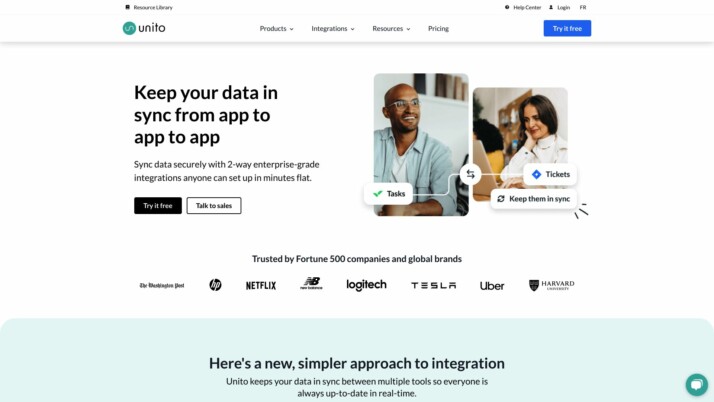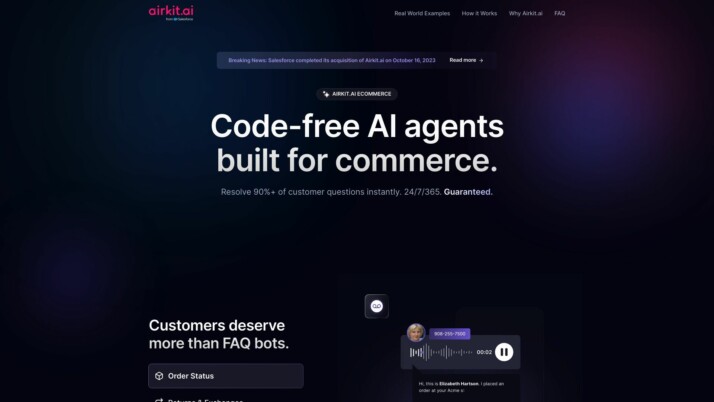Unito vs. Airkit AI: Workflow Integration Meets AI Support
AI platforms are revolutionizing how businesses operate, automate processes, and engage with customers. This comparison explores Unito, a powerful workflow integration tool, and Airkit AI, a specialized ecommerce customer support solution. We’ll examine how these platforms tackle different aspects of business automation, from cross-tool synchronization to AI-powered customer interactions. By analyzing their unique features, strengths, and limitations, we aim to provide a comprehensive overview to help you make informed decisions about which solution best fits your organization’s needs. We’ll also introduce SmythOS, an advanced AI platform that combines and expands upon many of the capabilities offered by Unito vs. Airkit AI, showcasing how it stands out in the evolving landscape of AI-driven business solutions.
Unito Overview
Unito offers a powerful integration platform designed to connect diverse tools and streamline workflows across teams. Their Sync Platform enables seamless two-way data synchronization between popular project management, development, and collaboration tools.
Unito’s visual workflow designer allows users to create custom integrations without coding. This no-code approach empowers teams to build complex automations tailored to their specific needs. The platform’s deep field mapping capabilities ensure data flows accurately between connected applications, maintaining consistency across tools.


Unito’s visual workflow designer allows users to create custom integrations without coding. This no-code approach empowers teams to build complex automations tailored to their specific needs.
Security stands out as a key strength for Unito. With SOC II Type 2 certification and HTTPS encryption, the platform provides enterprise-grade protection for sensitive data. Unito also supports OAuth2 authentication, enhancing access control and user management.
Unito excels in its breadth of integrations, supporting connections with industry-leading tools like Asana, Jira, Trello, and GitHub. This versatility allows teams to maintain their preferred workflows while breaking down information silos. The platform’s ability to sync comments and attachments further enhances collaboration across different tools.
While Unito offers powerful integration capabilities, it lacks some advanced features found in AI-focused platforms. The absence of AI agents, autonomous problem-solving, and multimodal interactions may limit its applicability in more complex AI-driven scenarios. However, for organizations seeking to streamline their existing tool ecosystems and improve cross-team collaboration, Unito provides a robust and user-friendly solution.
Airkit AI Overview
Airkit AI empowers businesses to create no-code AI agents for automating customer support in ecommerce. Recently acquired by Salesforce, Airkit’s platform deploys intelligent agents capable of resolving over 90% of common customer queries related to orders, returns, and product information.


Airkit AI empowers businesses to create no-code AI agents for automating customer support in ecommerce… capable of resolving over 90% of common customer queries
The platform’s visual builder allows users to construct AI agents without coding expertise, significantly reducing development time. Airkit AI integrates seamlessly with existing help desk and CRM systems, ensuring smooth implementation into current workflows. The cloud-based infrastructure automatically scales to meet demand spikes, providing reliable performance during peak periods.
Airkit AI’s pre-built conversational skills for ecommerce streamline agent creation, allowing businesses to quickly implement industry-specific solutions. The platform’s continuous learning capabilities enable AI agents to improve their resolution rates over time, adapting to new scenarios and customer needs.
Airkit AI focuses on enhancing customer experiences by providing personalized, 24/7 support through human-like AI interactions. This approach not only improves customer satisfaction but also prevents agent burnout by automating repetitive support tasks. The platform’s emphasis on ecommerce-specific solutions positions it as a valuable tool for online retailers seeking to optimize their customer service operations.
Airkit AI focuses on enhancing customer experiences by providing personalized, 24/7 support through human-like AI interactions.
By joining forces with Salesforce, Airkit AI aims to significantly enhance the customer service capabilities available to Salesforce users. The integration of Airkit’s ecommerce-focused AI agents into the Salesforce ecosystem promises to deliver rapid automation of support tasks and improved customer satisfaction for a wide range of businesses.
Feature Comparison
Unito and Airkit AI offer distinct approaches to workflow automation and AI-powered customer support, respectively. While both platforms aim to streamline business processes, they diverge significantly in their core functionalities and target use cases.
Unito excels in workflow integration, providing robust two-way synchronization between popular project management and collaboration tools. Its visual workflow designer enables users to create custom integrations without coding, facilitating seamless data flow across disparate platforms. Unito’s strength lies in its ability to break down information silos and enhance cross-team collaboration.
In contrast, Airkit AI focuses on AI-powered customer support automation for ecommerce. Its no-code platform allows businesses to rapidly deploy intelligent agents capable of resolving common customer queries related to orders, returns, and product information. Airkit AI’s pre-built conversational skills for ecommerce and integration with existing help desk systems position it as a specialized solution for online retailers.
A key feature gap between the two platforms is their approach to AI implementation. While Airkit AI leverages AI for customer interactions, Unito does not offer AI agents or autonomous problem-solving capabilities. This limits Unito’s ability to provide intelligent, context-aware automation compared to Airkit AI’s specialized ecommerce support agents.
In terms of security, both platforms prioritize data protection. Unito offers SOC II Type 2 certification and HTTPS encryption, while Airkit AI, as part of Salesforce, likely adheres to enterprise-grade security standards. However, specific details about Airkit AI’s security measures are not explicitly mentioned in the available information.
Feature Comparison Table
| Unito | Airkit AI | SmythOS | |
|---|---|---|---|
| CORE FEATURES | |||
| Visual Builder | ✅ | ❌ | ✅ |
| Autonomous Agents | ❌ | ✅ | ✅ |
| Explainability & Transparency | ✅ | ❌ | ✅ |
| Debug Tools | ✅ | ❌ | ✅ |
| Multimodal | ❌ | ❌ | ✅ |
| Multi-Agent Collaboration | ✅ | ❌ | ✅ |
| Human-AI Interaction | ❌ | ✅ | ✅ |
| Audit Logs for Analytics | ✅ | ❌ | ✅ |
| Work as Team | ✅ | ❌ | ✅ |
| Agent Work Scheduler | ❌ | ❌ | ✅ |
| SECURITY | |||
| IP Control | ❌ | ❌ | ✅ |
| COMPONENTS | |||
| Foundation AIs | ❌ | ❌ | ✅ |
| Huggingface AIs | ❌ | ❌ | ✅ |
| Zapier APIs | ✅ | ❌ | ✅ |
| Classifiers | ❌ | ❌ | ✅ |
| Logic | ❌ | ✅ | |
| Data Lakes | ❌ | ❌ | ✅ |
| DEPLOYMENT OPTIONS (EMBODIMENTS) | |||
| Deploy as API | ✅ | ❌ | ✅ |
| Deploy as Webhook | ❌ | ❌ | ✅ |
| Staging Domains | ❌ | ❌ | ✅ |
| API Authentication (OAuth + Key) | ✅ | ❌ | ✅ |
| Deploy as Site Chat | ❌ | ✅ | ✅ |
| Deploy as Scheduled Agent | ❌ | ❌ | ✅ |
| Deploy as GPT | ❌ | ❌ | ✅ |
| DATA LAKE SUPPORT | |||
| Hosted Vector Database | ❌ | ❌ | ✅ |
| Sitemap Crawler | ❌ | ❌ | ✅ |
| YouTube Transcript Crawler | ❌ | ❌ | ✅ |
| URL Crawler | ❌ | ❌ | ✅ |
| PDF Support | ❌ | ❌ | ✅ |
| Word File Support | ❌ | ❌ | ✅ |
| TXT File Support | ❌ | ❌ | ✅ |
Best Alternative to Unito and Airkit AI
SmythOS stands out as a superior alternative to Unito and Airkit AI, offering a comprehensive AI agent development platform that combines ease of use with powerful features. Our drag-and-drop interface eliminates the need for coding expertise, making advanced AI accessible to users of all skill levels. Unlike Unito’s focus on workflow integration or Airkit AI’s specialized ecommerce support, SmythOS provides a versatile foundation for creating AI agents across unlimited use cases.
SmythOS stands out as a superior alternative to Unito and Airkit AI, offering a comprehensive AI agent development platform that combines ease of use with powerful features.
We excel in autonomous agent capabilities, a feature notably absent in Unito and limited in Airkit AI. SmythOS agents can operate independently, tackling complex tasks and integrating seamlessly with various APIs and data sources. This autonomy extends to multi-agent collaboration, enabling teams of AI agents to work together on sophisticated projects, a capability neither Unito nor Airkit AI can match.
Our platform’s extensive integration ecosystem surpasses both competitors. While Unito offers integration with project management tools and Airkit AI focuses on ecommerce systems, SmythOS connects with a vast array of services, AI models, and APIs. This flexibility allows users to create AI solutions that fit seamlessly into existing workflows across industries.
SmythOS also outperforms in deployment options. We offer versatile deployment as APIs, webhooks, chatbots, and even GPT models, providing unparalleled flexibility in how AI agents can be utilized. This contrasts sharply with Unito’s limited API deployment and Airkit AI’s focus on site chat implementations. Our scalable architecture ensures that as your needs grow, SmythOS grows with you, supporting enterprise-level deployments without compromising performance.
SmythOS also outperforms in deployment options… providing unparalleled flexibility in how AI agents can be utilized.
By choosing SmythOS, users gain access to a future-proof platform that continually evolves to meet emerging AI trends and user needs. Our commitment to user-friendly design, coupled with advanced features like multimodal interactions and ethical AI practices, positions SmythOS as the ideal choice for those seeking to harness the full potential of AI agent technology.
Conclusion
Unito and Airkit AI offer powerful solutions for workflow integration and customer support automation respectively. Unito excels in connecting diverse tools and streamlining cross-team collaboration, while Airkit AI focuses on AI-powered ecommerce support. Both platforms provide no-code solutions, enhancing accessibility for non-technical users.
However, SmythOS emerges as the superior choice, offering unparalleled versatility and AI capabilities. Our platform combines the strengths of both competitors and extends far beyond. With SmythOS, users can create and deploy sophisticated AI agents across multiple channels, from APIs to chatbots, without coding expertise.
SmythOS’s drag-and-drop interface, extensive integration ecosystem, and support for various AI models provide unmatched flexibility. Our platform enables multi-agent collaboration, advanced problem-solving, and seamless deployment options. These features position SmythOS as the ideal solution for businesses seeking to harness AI’s full potential across diverse applications.
To experience the future of AI automation and integration, create a free SmythOS account today. Explore our comprehensive documentation to unlock the full power of SmythOS and revolutionize your workflow. Join us in shaping the future of AI-driven business solutions.
Last updated:
Disclaimer: The information presented in this article is for general informational purposes only and is provided as is. While we strive to keep the content up-to-date and accurate, we make no representations or warranties of any kind, express or implied, about the completeness, accuracy, reliability, suitability, or availability of the information contained in this article.
Any reliance you place on such information is strictly at your own risk. We reserve the right to make additions, deletions, or modifications to the contents of this article at any time without prior notice.
In no event will we be liable for any loss or damage including without limitation, indirect or consequential loss or damage, or any loss or damage whatsoever arising from loss of data, profits, or any other loss not specified herein arising out of, or in connection with, the use of this article.
Despite our best efforts, this article may contain oversights, errors, or omissions. If you notice any inaccuracies or have concerns about the content, please report them through our content feedback form. Your input helps us maintain the quality and reliability of our information.
